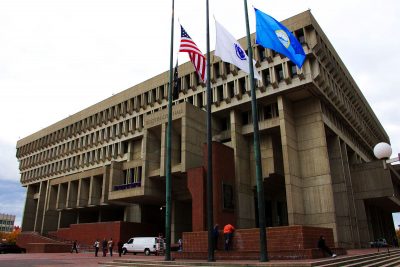
By: Olga Benacerraf, Madison Mercado
Mayoral candidates Michelle Wu and Annissa Essaibi George will advance to the general election Nov. 2 for Boston’s next mayor, following their victories in the preliminary mayoral election Sept. 14.
Bostonians selected these two candidates from a ballot that included Acting Mayor Kim Janey, City Council President Andrea Campbell and former Chief of Economic Development John Barros.
As the remaining two candidates prepare to face off in the general election, voters who supported other contenders in the primaries are faced with the question of who to elect moving forward.
Richard Parr, the Research Director for The MassINC Polling Group, said polls conducted before the election asking voters to rank their second choice candidate could be an indicator of how those groups will vote. Parr said Michelle Wu was often the second choice of Kim Janey voters and Andrea Campbell voters.
“It looks like Michelle Wu is, I guess you could say, better positioned to win in November,” Parr said. “But of course, a lot could change between now and then, a lot could happen that could change people’s minds.”
Voting data from the MassINC further shows that Wu was preferred over Essaibi George in almost every precinct won by Janey, Campbell or Barros, while at the same time placing second in all but one of Essaibi George’s precincts.
Parr said this “suggests that perhaps she has more support already on the ground there, maybe she can grow that support a little bit more easily than Annisa Essaibi George can do in some of those places.”
As for city-wide demographics, Parr explained that while Wu did well on the western side of the city, Essaibi George found support further down south, in whiter, suburban areas.
“I’m really looking at that dividing line between West Roxbury and Roslindale as a place where these two candidates are going to be fighting for votes pretty hard,” he said.
The high turnout rates and shifting demographics of that area will make it an interesting place to watch come November, Parr said.
“It’s changing neighborhood by neighborhood, block by block, down there so I think that’ll be a really interesting place to look,” he said.
None of the candidates whose campaigns ended in the preliminary election have yet endorsed Wu or Essaibi George.
“It’s early, I mean, it’s just a week after the election, but there’s still time,” Parr said. “I think people are probably negotiating behind the scenes and trying to decide what they want to do and whether they want to endorse at all.”
Since the preliminary election, Wu received endorsements from State Sen. Sonia Chang-Díaz, State Rep. Liz Miranda, D-Mass., and the healthcare union 1199SEIU Massachusetts.
“When we start out by asking ourselves what’s politically feasible rather than what will actually solve problems, we negotiate against our own constituents. I want vision and delivery in my candidates,” Chang-Díaz is quoted saying in a Sept. 18 press release. “Michelle Wu is someone who can connect with all our communities across our city and build the multigenerational, multicultural, multiracial, multilingual coalition that we need in our city.”
Essaibi George received an endorsement from the electrician and technician union, Local 103 IBEW, after the preliminary election.
Ted Landsmark, distinguished professor of public policy and urban affairs at Northeastern University, said Boston’s relatively small size as a city puts it in a position to implement innovative strategies in a way not possible in a much larger city.
“What the next mayor will have to do is to create and affect a new, more regional brand of what Boston is, and does in a way that leverages resources,” Landsmark said.
He added the city needs regional solutions to tackle problems like opioid addiction, education, employment and housing.












































































































